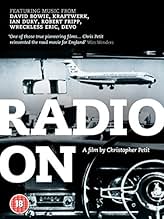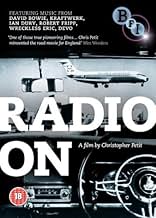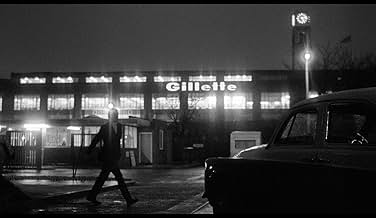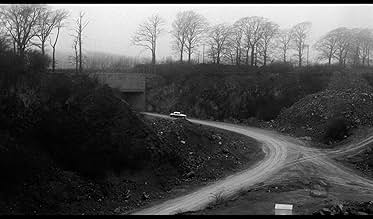Radio On
- 1979
- 1h 44m
ÉVALUATION IMDb
6,5/10
1,3 k
MA NOTE
Ajouter une intrigue dans votre langueIn 1970s Britain, a man drives from London to Bristol to investigate his brother's death, and the purpose of his trip is offset by his encounters with a series of odd people.In 1970s Britain, a man drives from London to Bristol to investigate his brother's death, and the purpose of his trip is offset by his encounters with a series of odd people.In 1970s Britain, a man drives from London to Bristol to investigate his brother's death, and the purpose of his trip is offset by his encounters with a series of odd people.
- Prix
- 1 victoire et 1 nomination au total
Avis en vedette
Former Time Out critic, Christopher Petit's directorial debut, Radio On, shows its European credentials well. I say this for a couple of reasons. For one, like the French New Wave participants, Petit began as a film critic, and the sparing nature of this existential road movie, was self- consciously attempting to move British cinema towards a European style. Secondly, and far more telling, is the influence and participation of the New German Cinema of the 1970's. Whilst interviewing Wim Wenders, the subject of Petit's own screenplay arose, and Wenders was impressed. Therefore, Wenders became associate producer, and also lent the use of his cinematographer, Martin Schafer.
Beautifully shot in monochrome, the black and white imagery displays its artful intentions. We follow Robert (David Beames) as he drives from London to Bristol, after being informed that his brother has committed suicide. On his journey, he encounters several unhinged British citizens, including a Glaswegian squaddie with anger management issues, as well as meeting Sting at a petrol station, who seems to be obsessed with Eddie Cochran. Not much really happens in the film, but the most significant (at least the longest) "relationship" is with a German woman, Ingrid (Lisa Kreuzer - who was in Wenders' Alice in the Cities (1974 - Review #96)), who is searching for her missing daughter named Alice (a possible reference to the aforementioned German film.
This is a bleak representation of 1970's Britain. Not a hard task in itself (you could have pointed a camera anywhere in '70's Britain, and it would have been depressing). But what was fundamental to Petit's intentions, was actually a comment on the decline of British cinema. The main output of British cinema was within the prurient genre of the repressed "sex comedies" such as the on-going Carry On.. films, or the equally lamentable Confessions... series with Robin Askwith. When there was any serious attempt at British cinema, they were barely seen. Petit, felt that the Americanisation of our cinema's and the fact that our national cinema was laughable, was decreasing our cultural identity. Radio On is an attempt to move our cinema towards a more European, existential path, and with a more political consciousness.
www.the-wrath-of-blog.blogspot.com
Beautifully shot in monochrome, the black and white imagery displays its artful intentions. We follow Robert (David Beames) as he drives from London to Bristol, after being informed that his brother has committed suicide. On his journey, he encounters several unhinged British citizens, including a Glaswegian squaddie with anger management issues, as well as meeting Sting at a petrol station, who seems to be obsessed with Eddie Cochran. Not much really happens in the film, but the most significant (at least the longest) "relationship" is with a German woman, Ingrid (Lisa Kreuzer - who was in Wenders' Alice in the Cities (1974 - Review #96)), who is searching for her missing daughter named Alice (a possible reference to the aforementioned German film.
This is a bleak representation of 1970's Britain. Not a hard task in itself (you could have pointed a camera anywhere in '70's Britain, and it would have been depressing). But what was fundamental to Petit's intentions, was actually a comment on the decline of British cinema. The main output of British cinema was within the prurient genre of the repressed "sex comedies" such as the on-going Carry On.. films, or the equally lamentable Confessions... series with Robin Askwith. When there was any serious attempt at British cinema, they were barely seen. Petit, felt that the Americanisation of our cinema's and the fact that our national cinema was laughable, was decreasing our cultural identity. Radio On is an attempt to move our cinema towards a more European, existential path, and with a more political consciousness.
www.the-wrath-of-blog.blogspot.com
Opening scene: like a badly lit YouTube video with camera tracking around a dingy flat in the dark.
A lot of dinge. Silences devoid of talking but staring from back of head off out into alienated nowheres.
Perpetual gloom is hungover every scene. This is England of 1979. Looking as bleak and despondent as I remember it. Thatcher the milk-snatcher had just come to power.
Not just dark and dim, but dull the first time i saw it. The plot is minimal and pointless (i.e beside the point) Concerned more with observational detachment than motivational character development. It's got a morose London Dj driving his Rover past monolithic tower-blocks out towards the desolate west country. Listening to Kraftwerk tapes sent by dead brother.
Dj like an alienated mopey nobody passively drifts into and out of various encounters of estrangement with other alienated mopey no-bodies (Sting still tries to be Sting though as a solitary and subdued petrol attendant singing Eddie Cochran on guitar).
This is Wim Wenders country. The existential road movie switched from soul-less autobahn to empty A4. Wenders cinematographer (Martin Schafer) is doing all the b/w monochrome melancholy with the camera. Even got Liza Kreuzer from Alice in the Cities looking for her daughter Alice (from Alice in the Cities?). Maybe she's in Weston-Super-Mare. Lets go there.
This has become a cult film. Critics liked it because it tried to be different, i.e the same as their beloved Wim. A cool German art-house sensibility transplanted to 1970′s England. Makes it feel like a depressingly depressive place. Even more depressingly depressive than it is now.
A lot of dinge. Silences devoid of talking but staring from back of head off out into alienated nowheres.
Perpetual gloom is hungover every scene. This is England of 1979. Looking as bleak and despondent as I remember it. Thatcher the milk-snatcher had just come to power.
Not just dark and dim, but dull the first time i saw it. The plot is minimal and pointless (i.e beside the point) Concerned more with observational detachment than motivational character development. It's got a morose London Dj driving his Rover past monolithic tower-blocks out towards the desolate west country. Listening to Kraftwerk tapes sent by dead brother.
Dj like an alienated mopey nobody passively drifts into and out of various encounters of estrangement with other alienated mopey no-bodies (Sting still tries to be Sting though as a solitary and subdued petrol attendant singing Eddie Cochran on guitar).
This is Wim Wenders country. The existential road movie switched from soul-less autobahn to empty A4. Wenders cinematographer (Martin Schafer) is doing all the b/w monochrome melancholy with the camera. Even got Liza Kreuzer from Alice in the Cities looking for her daughter Alice (from Alice in the Cities?). Maybe she's in Weston-Super-Mare. Lets go there.
This has become a cult film. Critics liked it because it tried to be different, i.e the same as their beloved Wim. A cool German art-house sensibility transplanted to 1970′s England. Makes it feel like a depressingly depressive place. Even more depressingly depressive than it is now.
I had the pleasure of attending a screening of 'Radio On 'presented by its director Chris Petit.
Often described as "austere", and rightly so, the influence of Wim Wenders is immediately clear, but unlike Wenders' which films try to hide a sense of self importance behind lengthy banality it is this film's very understatedness that is the key to its (limited) success.
Halliwell's described this as a film "barely able to summon up any interest in its characters" although it is the very detached and unemotional stance of Petit towards his lead that makes this such an unbearably real portrayal of disenchantment, we begin to feel disenfranchised with humanity itself.
Pointless Trivia: At the premiere screening of this film no one recognised the lead actor amongst the crowd as he has a shock of orange hair undetectable in a black and white movie).
Often described as "austere", and rightly so, the influence of Wim Wenders is immediately clear, but unlike Wenders' which films try to hide a sense of self importance behind lengthy banality it is this film's very understatedness that is the key to its (limited) success.
Halliwell's described this as a film "barely able to summon up any interest in its characters" although it is the very detached and unemotional stance of Petit towards his lead that makes this such an unbearably real portrayal of disenchantment, we begin to feel disenfranchised with humanity itself.
Pointless Trivia: At the premiere screening of this film no one recognised the lead actor amongst the crowd as he has a shock of orange hair undetectable in a black and white movie).
A radio DJ drives from London to Bristol to investigate the death of his brother. Along the way he encounters some odd people and listens to some pretty cool music. Former film critic Christopher Petit crafts a very deliberate homage to the early films of Wim Wenders (who was a producer), even using Wenders's cinematographer and actress Lisa Kreuzer (who may even be reprising her role from "Alice in the Cities"). This is a very slow and uneventful film, but if you appreciate Wenders's existential road films, you should love this one. Sting's debut role here is the best role he ever had as a fanatical Eddie Cochran fan. David Bowie, Kraftwerk, Ian Dury and Wreckless Eric are all featured on the soundtrack.
This is one of Britain's forgotten films (only 4 IMDb reviews at the time of writing these comments, nearly 30 years after it was made). The first film by the then film critic Chris Petit, made in 1979, it conveys accurately the bleakness - and the depressing music - of the late 1970s.
The plot is minimal. A morose, alienated man learns of his brother's death and travels from London to Bristol to find out more. The 'quest' is half-hearted and his encounters on the road and in Bristol are unsatisfactory and unfulfilled. Nothing seems worthwhile following through. whether it is his investigation into his brother's life and death, his encounter with a German woman or even his relationship with his antique Rover car.
The B/W photography is splendid, matching perfectly the mood of alienation and the bleak picture of a part of England in the winter of 1979. The influence of Wim Wenders (the producer) is clear but it is very distinctively an English film, worth seeing and listening to if only to remind us of the dismal '70s - but having seen it, that's enough. Interesting, but not a classic.
The plot is minimal. A morose, alienated man learns of his brother's death and travels from London to Bristol to find out more. The 'quest' is half-hearted and his encounters on the road and in Bristol are unsatisfactory and unfulfilled. Nothing seems worthwhile following through. whether it is his investigation into his brother's life and death, his encounter with a German woman or even his relationship with his antique Rover car.
The B/W photography is splendid, matching perfectly the mood of alienation and the bleak picture of a part of England in the winter of 1979. The influence of Wim Wenders (the producer) is clear but it is very distinctively an English film, worth seeing and listening to if only to remind us of the dismal '70s - but having seen it, that's enough. Interesting, but not a classic.
Le saviez-vous
- AnecdotesIn Britain, this film had a limited release on the art-house circuit in 1980 in a double-bill with a famous film made half-a-century earlier, Luis Bunuel's "L'Age D'Or", which had only recently come off the censor's banned list. One critic remarked that this double-billing meant that he had had both his best and his worst cinema-going experience of 1980 on the same evening.
- ConnexionsFeatured in Radio On Remix (1998)
Meilleurs choix
Connectez-vous pour évaluer et surveiller les recommandations personnalisées
- How long is Radio On?Propulsé par Alexa
Détails
- Date de sortie
- Pays d’origine
- Langues
- Aussi connu sous le nom de
- Radio on
- Lieux de tournage
- M4, Londres, Angleterre, Royaume-Uni(6 High-rise Flats on Green Dragon Lane)
- sociétés de production
- Consultez plus de crédits d'entreprise sur IMDbPro
- Durée1 heure 44 minutes
- Couleur
- Mixage
- Rapport de forme
- 1.85 : 1
Contribuer à cette page
Suggérer une modification ou ajouter du contenu manquant

























